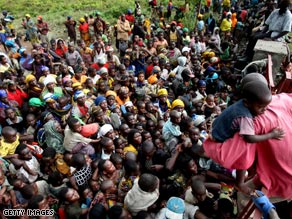ICRC Activities in Zaire/Democratic Republic of Congo: 1994 - 3 February 1999 (International Committee of the Red Cross , 124 p.)


(introduction...)

Zaire

Zaire/Rwanda/Burundi: ICRC voices acute anxiety

Zaïre: Masisi - a forgotten conflict

Zaire: ICRC resumes activities in Masisi

Zaire, (delegation also covers the Congo)

Zaire: tragic plane crash in Kinshasa

Rwanda/Zaire: “ICRC transit service”

Zaire: new humanitarian emergency in North Kivu

Update No. 96/1 on ICRC activities in Rwanda

South Kivu: ICRC calls for restraint

Update No. 96/1 on ICRC activities in Zaire

Kivu: a major human tragedy in the making

Tribute to Zairian Red Cross volunteers

Great Lakes Region: assistance in Goma

Breaking the humanitarian deadlock in Kivu

Update No. 96/2 on ICRC activities in Zaire

Update No. 96/3 on ICRC activities in Zaire

Great Lakes: ICRC ready to act

Update No. 96/4 on ICRC activities in Zaire

Great Lakes: volunteers in action

Zaire: ICRC operation gets under way

Update No. 96/5 on ICRC activities in Zaire

Update No. 96/6 on ICRC activities in Zaire

Update No. 96/7 on ICRC activities in Zaire

Great lakes: displaced: a zairian’s firsthand account “I had to cover 220 miles on foot”

Update No. 96/8 on ICRC activities related to the Zairian crisis

Update No. 9 on ICRC activities related to the Zairian crisis

Rwanda: 1,000 children already reunited with their families

Update No. 10 on ICRC activities related to the Zairian crisis

Update No. 11 on ICRC activities related to the Zairian crisis

Update No. 12 on ICRC activities related to the Zairian crisis

Update No. 13 on ICRC activities related to the Zairian crisis

Update No. 14 on ICRC activities related to the Zairian crisis

Update No. 15 on ICRC activities related to the Zairian crisis

Zaire: ICRC still only organization working in Shabunda

Update No. 16 on ICRC activities related to the Zairian crisis

Zaire, (delegation also covers the Congo)

Update No. 1 on ICRC activities related to the Zairian crisis

Rwanda: refugees return to Kamembe

Rwanda: nearly 8,000 children reunited with their families

Update No. 97/02 on ICRC activities related to the Zairian crisis

Update No. 97/03 on ICRC activities related to the Zairian conflict

Update No. 97/04 on ICRC activities related to the Zairian conflict

Zaire: back in Kisangani

Zaire: ICRC demands access to conflict victims

Zaire: airlift for displaced Zairians

Zaire: Lives of thousands of refugees at stave

Zaire: More than 2,000 Zairians back home

Update No. 97/6 on ICRC activities related to the Zairian conflict

Zaire

Zaire: Ten volunteers of the Zairian Red Cross killed in Kenge

Update No. 97/8 on ICRC activities related to the Zairian conflict

Zaire: More work for the tracing agency

Democratic Republic of Congo (former Zaire): After the storm

Update No. 9 on ICRC activities in the Democratic Republic of Congo (formerly Zaire) and neighbouring countries

Rwanda: Do you know this child?

Democratic Republic of Congo: Homeward bound

Update No. 97/10 on ICRC activities in the Democratic Republic of the Congo (former Zaire)

Brazzaville and Kinshasa: Medical aid on both sides of the river Congo

Update No. 2 on ICRC activities in Congo-Brazzaville

Brazzaville/Kinshasa: Relief work progressing

Democratic Republic of the Congo: Priority in Kivu given to clean water and medical care

Democratic Republic of the Congo: Displaced people go home on barges

Democratic Republic of the Congo

ICRC denounces killing of employee in Kinshasa

The ICRC condemns and deplores two serious security incidents

Democratic Republic of the Congo: ICRC opens office in Bunia

Democratic Republic of the Congo: Health programme in Oriental province

Democratic Republic of the Congo: inauguration of limb-fitting workshop in Kinshasa

Democratic Republic of the Congo: ICRC appeals for compliance with humanitarian rules

Democratic Republic of the Congo: First visits to detainees and water for population

Democratic Republic of the Congo: Water and war

Democratic Republic of the Congo: ICRC gains access to further place of detention in Kinshasa

Democratic Republic of the Congo: Visits to detainees and family news

Democratic Republic of the Congo

Central African Republic: Congolese civilians arrive in Bangui

Democratic Republic of the Congo: ICRC opens an office in Kalemie
Democratic Republic of the Congo: Health programme in Oriental province
30 April 1998
ICRC News 98/17
The health programme launched eight months ago by the Belgian Red Cross, to which the ICRC delegated the project, is proving to be a success. The aim of the programme is to carry out repairs and develop primary health care services in seven of the 18 health centres in the Kabondo health district of the Oriental province of the Democratic Republic of the Congo.
“We have specific medical objectives”, explained project leader Dr Vale Alaluf, who is working with a team of locally recruited personnel. “Our goal is basically to attract more people to the centres by providing better treatment and preventive care.”
Dr Alaluf is lending her expertise to upgrade the skills of health centre staff in the care of pregnant women and pre-school children, and is also helping to train midwives.
With the support of the local population, the team renovating the centres has finished work in two towns, Yabiso and Yetu, and in two rural areas, Madula and Wanierukula. The other three centres - Foyer, Konga-Konga and Bafwaboli - will be ready by the end of August 1998.
The results are already visible, and the nurse in charge of Yabiso health centre, Avobuma Sidomie, is overjoyed. “We used to see barely 20 people a day. Since the centre was renovated, the number of daily consultations has doubled and many young mothers are coming to us.”













